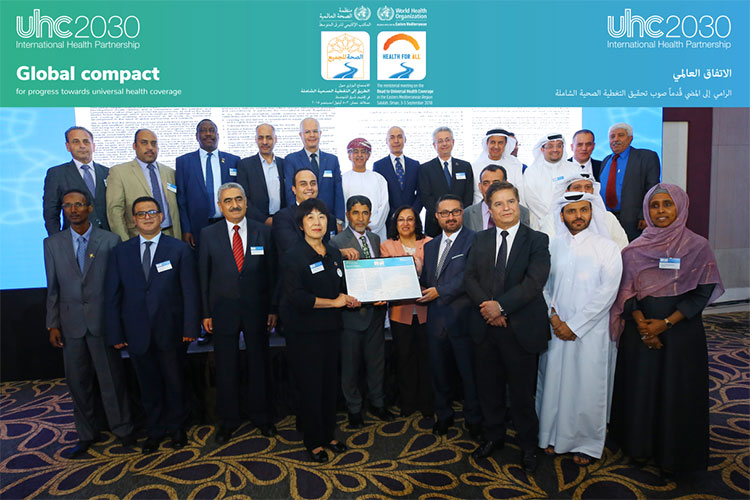
4 September 2018, Salalah, Oman – Today, countries of WHO’s Eastern Mediterranean Region signed a UHC2030 Global Compact during the “Ministerial meeting on the road towards universal health coverage” taking place in Salalah, Oman, from 3 to 5 September 2018. Ministers of health and heads of delegations collectively approved the landmark document, making the Region the first among WHO’s 6 regions to do so.
The signing of the UHC2030 Global Compact demonstrates a high level of commitment to take action to make progress towards UHC by all countries of the Region. It means that signatories and their governments have commited to working together effectively to accelerate progress towards UHC through building equitable, resilient and sustainable health systems.
The UHC 2030 Global Compact aims to build a political momentum and advocate for sufficient, appropriate and well-coordinated resource allocations to health systems and to encourage partners to track progress and be accountable.
“We invited countries of the Region to sign the Global Compact jointly as a sign of regional commitment and solidarity towards UHC. Political will and commitment are essential to secure and sustain investment in health and drive appropriate health systems reforms,” said Dr Ahmed Al-Mandhari, WHO’s Regional Director for the Eastern Mediterranean.
The UHC 2030 International Health Partnership serves as a platform to exchange knowledge and act collectively to strengthen health systems. By joining UHC2030, signatories will have access to a network of global health experts and the chance to share experiences and work collectively to strengthen health systems.
The meeting was inaugurated yesterday under the patronage of HRH Al-Sayed Asaad Bin Tariq Bin Taimour Al Said, Oman’s Deputy Prime Minister for International Relations and Cooperation, and the Special Representative of His Majesty Sultan Qaboos Bin Said.
H.E. the Minister of Health of Oman Dr Ahmed Mohammed Obaid Al-Saidi highlighted the steps already taken by Oman towards achieving UHC, including expanding the package of essential health services provided to all of Oman’s population.
In his opening speech, Dr Al-Mandhari reiterated that UHC fundamentally focuses on people. This means that all people and communities should be able to access the health services they need, of sufficient quality, without incurring financial hardship.
In a recorded message to the meeting, Dr Tedros Adhanom Ghebreyesus, WHO’s Director-General, declared that UHC was WHO’s top priority, considering UHC and health security as two sides of the same coin. “Strong health systems, built on the foundation of people-centred primary care, are the best investment in reducing inequalities, and the best defence against the impact of emergencies,” the Director-General said.
In his remarks as a keynote speaker, HE Professor Recep Akadog, Member of Parliament and former Minister of Health and Deputy Prime Minister in Turkey, highlighted his country’s transformation of the health care system. It had not only paved the way towards universal health coverage in Turkey but served as an example that other countries might follow.
Another keynote speaker was Dr Sania Nishtar. As co-chair of the WHO Independent High-level Global Commission on NonCommunicable Diseases (NCDs) Dr Nishtar said NCDs must be part of UHC frameworks. NCDs are the world’s biggest killers and the leading cause of preventable morbidity and disability.
In her remarks as a keynote speaker, HRH Princess Dina Mired, the President-elect of the Union for the International Cancer Control, explained how UHC could reduce the number of cancer deaths and disparities in health outcomes.
During technical sessions, participants were briefed on a World Bank analysis of UHC reforms in over 40 countries with a total of 2.6 billion people. Among the lessons that emerged was that all countries regardless of their income status can and should move towards UHC. “A country does not need to be rich to start moving towards UHC,” said Dr Fernando Montenegro Torres, a senior health economist at the World Bank.
Dr Zafar Mirza, Director of Health System Development in the WHO Regional Office for the Eastern Mediterranean, highlighted the importance of the package of essential health services being provided to the whole of a population in the context of UHC, along with a set of intersectoral services which address behavioural and environmental risks.
On the last day of the meeting participants will further discuss efforts to strengthen health systems to achieve UHC and safeguard against health crises, and what is meant by “leaving no one behind” – a key principle of the 2030 Agenda for Sustainable Development.
Related link
Ministerial meeting paves the way for universal health coverage in the Region
28 August 2018
For more information:
WHO Regional Office for the Eastern Mediterranean:
Dr Fethiye Gülin Gedik Coordinator
Health Workforce Development
Mobile: +20 127 545 0814
E-mail:
Omid Mohit
Technical Manager
Media and Communications
Mobile: +20 106 881 3340
Email:
Mona Yassin
Communications Officer Media and Communications
Mobile: +20 100 601 9284
Email:


